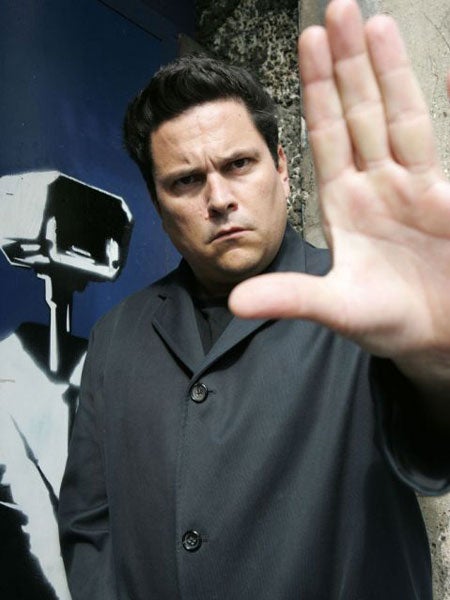Last Night's TV: The Complainers, Five; Stephen Fry and the Machine that Made Us, BBC4
Watch out... he's ready to grumble

My daughter's English homework last week was to write a robust counterblast to a column in a Sunday newspaper that averred that the British, for so long considered paragons of good manners, have become a rude, inconsiderate, disrespectful, loutish race.
She asked if I would give her some pointers. "It's not as if you've got anything else to do with your time, you daft old codger," she said. Oh, all right, she didn't. "Please can you help me, daddy," she said. So I did, though it was a struggle, because I agreed with much that the columnist had written. Nevertheless, I ventured that maybe he was guilty of stereotyping twice over, that perhaps the vision of Britain half a century ago as a nation collectively respecting its elders, and giving up its seat to pregnant women on buses, was as misconceived as the vision now of the British as litter-scattering, foul-mouthed recusants. The idea that society wasn't so marvellous then supports the assertion that it's not so awful now.
If I had already watched Dom Joly's The Complainers, I could have given her more material. Joly sent a couple of stooges into a restaurant, their brief to behave with increasing obnoxiousness while a hidden camera filmed the response of the people on the neighbouring table. In two cases, the folk on the next table simply got up and moved elsewhere, issuing not a word of complaint despite a litany of offences to complain about. In the third instance, a man finally voiced his annoyance, but it had taken a smashed glass, full of wine that splattered his trouser leg, to propel him to the end of his tether.
Joly's point was that the British do not readily complain, perhaps because we are still innately good-mannered. He thinks we should rail against petty modern irritations, and those who would curb our liberties. To this end, one of his colleagues started fixing a wheel clamp to an illegally-parked van while its driver, an official wheel-clamper, was clamping an illegally-parked car. Unfortunately, the clamper's response to being clamped was bemusement rather than righteous anger, which slightly diminished the effect.
There was much in this programme that was socially relevant. Joly addressed the Orwellian nightmare of five million CCTV cameras keeping tabs on us, for example. But he seemed a little over-protective of his reputation as a prankster. In sleepy Dawlish in Devon, where the CCTV cameras are disguised as lampposts, he asked a man who appeared to be partially blind whether he had seen any street crime. This encounter was shown over and over, rather as if the editing had been thrown to a couple of sniggering third-formers, vastly entertained by the spectacle of an elderly man wearing protective dark glasses being asked whether he had, wait for it, seen something. It was a curious, jarring misjudgement.
Still, for all its occasional ham-fistedness, and some confusion over its identity as it lurched between comment and comedy, The Complainers might just be worth following. A preview of next week's programme showed a man with a loud-hailer asking a loud-hailing, street-corner evangelist why he had to be so loud. "Jesus didn't have a loud-hailer," he bellowed. Quite so.
As for the question of whether politeness has ceased to be a British characteristic, I can only cite the umpire I heard officiating one of Tim Henman's matches at Wimbledon a few years back. "Please!" he said, trying to quieten an exuberant Centre Court crowd. The calls of "c'mon Tim" continued. "Please!" said the umpire again. Still the crowd shouted its encouragement. "Thank-you," said the umpire, almost testily. There were a few more cries. "Please," he said once more. I wrote at the time that only in Britain, of all the countries in the world, could a rebuke be couched as "please, please, thank-you, please." And that's still the case.
Besides, a nation that can boast Stephen Fry as one of its own can never be entirely dismissed as beyond the pale, gentility-wise. In Stephen Fry and the Machine That Made Us, he was at his most engaging, presenting with intelligent wit the story of the man who invented the printing press almost 600 years ago – Johannes Gutenberg from Mainz on the banks of the Rhine , "the silicon valley of medieval Europe".
This was a fine documentary, yet as notable for what it did not contain as for what it did. There was, television gods be praised, no dramatic reconstruction of Gutenberg and other Germans with medieval beards discussing font sizes, just Fry talking to other intelligent people and assembling a vivid picture of Gutenberg's life and work, helped by a talented carpenter, Alan May, who knocked up a convincing copy of Gutenberg's original press.

Watch Apple TV+ free for 7 day
New subscribers only. £9.99/mo. after free trial. Plan auto-renews until cancelled.
ADVERTISEMENT. If you sign up to this service we will earn commission. This revenue helps to fund journalism across The Independent.

Watch Apple TV+ free for 7 day
New subscribers only. £9.99/mo. after free trial. Plan auto-renews until cancelled.
ADVERTISEMENT. If you sign up to this service we will earn commission. This revenue helps to fund journalism across The Independent.
Fry thinks that the printing press dwarfs all other inventions. He could imagine a world without cars, telephones or computers, he said, but not without the printed word. I feel duty-bound, perhaps even vellum-bound, to agree. But here was a reminder that television, too, sometimes counts as a pretty decent invention.
Join our commenting forum
Join thought-provoking conversations, follow other Independent readers and see their replies
Comments
Bookmark popover
Removed from bookmarks